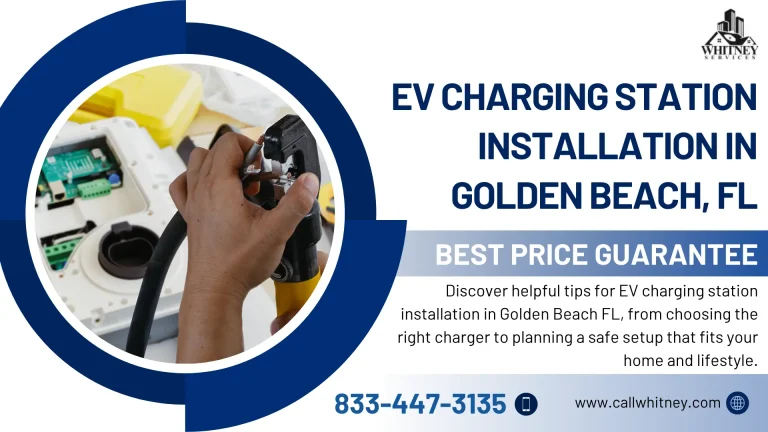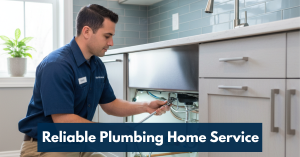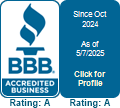If you’re thinking about EV charging station installation in Golden Beach, FL, you’re taking a very practical and future-forward step. More people are driving electric vehicles now, and having your own charger at home or business makes life so much easier.
But getting it right involves more than just picking a plug-in device. There are electrical, permitting, safety, and planning considerations to navigate — and that’s where having a trusted local provider like Whitney Services makes all the difference.
Here, I’ll walk you through everything you need to know so your EV charger installation in Golden Beach can go smoothly, from initial evaluation to long-term maintenance.
Key Takeaways
- Proper EV charger installation starts with assessing your home’s electrical capacity.
- Permits and inspections are very likely required under Florida regulations.
- Following the relevant codes, including National Electrical Code standards, ensures safety and reliability.
- For coastal areas like Golden Beach, the right hardware matters: weather-rated chargers, tough enclosures, surge protection.
- There may be incentives and programs that help offset installation costs.
- Choosing a licensed, experienced local company like Whitney Services ensures a seamless process.
Why Install an EV Charger at Home in Golden Beach, FL
Putting in your own EV charging station in Golden Beach brings real, tangible benefits:
Convenience at Home
No more driving out of your way to public stations or waiting for a free spot. When you have a charger at home, you simply plug in at night, and you’re ready to roll in the morning.
Long-Term Cost Savings
Charging at home is almost always cheaper than relying solely on public fast chargers. Over the years, those savings can add up.
Added Value to Your Property
As EVs become more common, homes that are EV-ready or already have a charger installed are increasingly desirable. It’s a value-add now and a selling point later.
Sustainability
Charging your EV with electricity from the grid (especially if paired with solar or clean energy) helps reduce emissions. That’s good for the planet—and for your carbon footprint.
What You Should Know Before You Start
Review Your Electrical Capacity
Before you even buy a charger, it’s smart to have an electrician come in and evaluate your electrical system:
- Many residential EV chargers, particularly Level 2, require a 240 volt circuit.
- Depending on how your home is wired, your existing panel might be enough — or it might need an upgrade or even a sub-panel.
- EV charging loads are considered continuous loads, which affects how the circuit is sized.
This kind of assessment helps prevent surprises and ensures your installation will be safe and code-compliant.
Understand Permitting and Inspection
In Florida, you’ll most likely need a permit for your EV charger installation. The process usually involves submitting plans, showing where the charger will go, how you’re wiring it, and your load calculations. After installation, an inspection is typically required before the charger can be “signed off.”
These steps are not just bureaucratic, they ensure your system is installed safely according to both electrical and building codes.
Meet Safety & Code Requirements
Your EV charging station must comply with key standards to meet safety regulations:
- Installations must align with National Electrical Code (NEC) Article 625, which governs EV charging systems. For example, EV loads are often treated as continuous loads, meaning overcurrent protection and conductor ampacity must be sized properly.
- The charger needs to be disconnectable and lockable if rated above certain levels.
- Outdoor installations must use weatherproof enclosures, and any outdoor receptacles need to be protected against moisture and rain.
Also, Florida regulations now require that EV chargers be installed by certified or registered electrical contractors. And once your charger is installed, you’re expected to keep maintenance and inspection records, sometimes for years.
Check Condo or HOA Rules (If Needed)
If you live in a condominium or a homeowners association (HOA) community, there can be extra considerations:
- Under Florida law, many condo owners have the right to install EV chargers in their assigned parking spaces, but there may be conditions imposed by the association.
- Some HOAs may require your installation to meet architectural standards, mandate a licensed electrician, or ask for proof of insurance.
- Make sure you coordinate with your association to get approval first, so there is no conflict later.
Choose the Right Charger for Your Life
Just selecting any EV charger isn’t enough, you want one that matches your use case:
- A Level 2 charger is usually ideal for home charging: it’s fast enough for overnight charging and doesn’t demand the costs or infrastructure of high-voltage fast chargers.
- Given Golden Beach’s coastal location, pick a charger with a weather-resistant rating, like NEMA-3R or better, to withstand humidity, salt air, and storms.
- Consider surge protection or a dedicated foundation for your charger to protect it from lightning and power fluctuations.
Hire the Right Electrician
This isn’t a weekend DIY project. Working with a licensed, experienced electrician brings many benefits:
- They can pull permits, design the circuit, and perform the installation properly.
- They understand code requirements, how to size the circuit, and how to safely ground and protect the charger.
- They will test the system once installed to make sure everything functions correctly and meets safety standards.
Cutting corners can lead to unsafe installations, failed inspections, or even voided warranties.
Plan for Long-Term Maintenance
A charger isn’t “install and forget.” Here’s what you should keep in mind:
- Keep documentation of the installation, including diagrams, permits, and load calculations.
- Check the unit periodically for wear, corrosion, or damage, especially if it’s mounted outside.
- Plan for inspections or maintenance cycles, depending on the manufacturer’s recommendations.
- If you ever add more EVs, consider future-proofing your installation for capacity expansion.
Explore Incentive Programs
Installing an EV charger can be more affordable than it seems if you take advantage of incentives:
- There is a federal tax credit, which can cover a significant portion of the installation cost for residential EV charging stations.
- Depending on your utility or location, there may be local rebate programs or special EV-friendly rate plans.
- Some utilities or charging providers may even offer installation assistance or discounts, so it’s worth asking around or checking your bill.
Why Choose Whitney Services
When you choose Whitney Services for your EV charger installation in Golden Beach, FL, you’re not just getting a contractor, you’re gaining a partner who cares about doing it right. Here’s how we make the process seamless:
Local Expertise
We know Golden Beach and understand the specific electrical and building code requirements that apply here in Florida.
Experienced Professionals
Our licensed electricians are trained in EV supply equipment, NEC standards, and best practices.
End-to-End Service
We handle everything: site assessment, panel review, wiring design, permitting, installation, and inspection.
Durable Solutions
We recommend outdoor-rated chargers and weatherproof enclosures that suit the coastal climate.
Ongoing Support
After installation, we remain available for maintenance, future upgrades, or any questions you might have.
Our goal is to make your EV charger installation painless, reliable, and something you’ll feel good about for years to come.
Conclusion
Putting in an EV charging station at home in Golden Beach, FL is more than just a convenience, it’s an investment in your future, your property, and the environment. But to get it right, you need proper planning, the right equipment, and a trusted team to do the work safely and to code.
At Whitney Services, we’re committed to delivering a smooth, professional experience — from that first consultation to the final inspection and beyond. If you’re ready to make your home EV-friendly, reach out to us. We’d be honored to help you every step of the way.
Frequently Asked Questions
Yes. Most EV charging station installations at home require a permit, and inspections are usually part of the process. This helps ensure that your installation is compliant with building and electrical codes and that safety is upheld.
Hiring a licensed electrician is highly advised. EV installations typically involve high-voltage wiring, continuous load calculations, and code requirements that are best handled by a professional. Improper installation can lead to safety hazards, failed inspections, or insurance issues.
A Level 2 charger is often the best choice for residential use: it offers faster charging than standard plugs, is suitable for daily use, and doesn’t require the infrastructure of commercial fast chargers. For outdoor or coastal installations, make sure the charger has a weatherproof rating and a durable housing.
That depends on your existing setup. An electrician can evaluate your electrical service, check load capacity, and determine whether you need a sub-panel, an upgraded panel, or simply a dedicated circuit. Without this assessment, you risk overloading your system.
Yes. There is a federal tax credit that can help cover part of the installation cost. There may also be local utility rebate programs or special EV rate plans available. It’s wise to explore these options to reduce your net cost.







